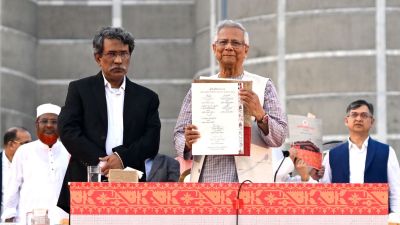Let the debate begin
On December 19, addressing the Scheduled Castes and Scheduled Tribes Members of Parliament Forum, Prime Minister Atal Bihari Vajpayee propos...

On December 19, addressing the Scheduled Castes and Scheduled Tribes Members of Parliament Forum, Prime Minister Atal Bihari Vajpayee proposed that reservation should be provided for weaker sections in the private sector. In the last two decades, Dalit activists and human rights activists have been demanding reservation in private sector. The demand for positive discrimination in the private sector emanates from the fact that this would enable participation of weaker sections in employment and the market since they suffer multiple discriminations. Now in the name of rightsizing and optimising, the employment rate is declining. Given the social milieu, Dalits and tribals will lose out the most in the downsizing process. Moreover, according to the 1948 Industrial Act, 18 sectors were reserved as public sector enterprises. Over the years, these have been also converted into the private sector; only half a dozen of these remain public sector.
Arguably, the demand for positive discrimination in the private sector is faced with stiff resistance. Some argue that job reservations in government service and educational institutions are subject to minimum cut-off marks. If a Dalit or tribal candidate does not get the minimum marks needed to qualify for admission for the civil service or an engineering college, he will be rejected even if the reserved quota is unfilled. However, jobs in the private sector are not determined on the basis of marks in an examination. There are no objective cut-off marks that can be used to establish minimum qualifications.
Nobody can insist that corporations must hold UPSC-type exams. That would not only be inefficient but unconstitutional: it would abrogate the right to carry on business. Some would argue that merit should be the determining factor in the selection of any candidate. Others argue that private companies are the outcome of private enterprise and they cannot be treated on par with public enterprises. The above arguments are countered by the following facts: the government provides safeguards to organisations in the private sector to promote their business. Foreign policy, export-import policies of the government contribute to the betterment of these businesses. Foreign investment in the private sector is possible because of government policies. And thus, it is expected from the private sector enterprises that they should fulfill their social responsibility.
These enterprises use public money through public financial institutions. The uplifting of the weaker sections is a stated objective of our country and thus reservation in private sector is part of the social responsibility of the government as well as the private sector. It is nothing but the fulfillment of the constitutional agenda of distributive justice.



- 01
- 02
- 03
- 04
- 05




























